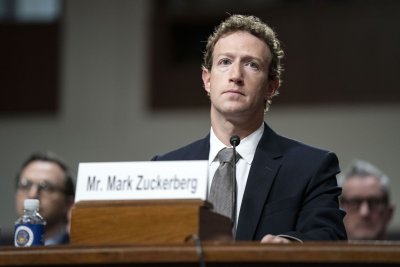
April 14 (UPI) — The U.S. government’s landmark antitrust suit, alleging Meta’s takeover of Instagram and WhatsApp was illegal, got underway Monday in Washington, D.C., following a six-year Federal Trade Commission investigation. Meta chief executive officer Mark Zuckerberg was the first to take the stand to defend his company.
The FTC claims Meta, the parent company of Facebook, Instagram and WhatsApp, sought to become a monopoly by acquiring its competitive rivals. In its complaint, the FTC accuses Meta of “anticompetitive conduct” and excessive control of the social media market.
“They decided that competition was too hard,” FTC attorney Daniel Matheson said Monday in his opening statement. “And it would be easier to buy out their rivals rather than compete with them.”
During Zuckerberg’s first day of testimony, he outlined the early days of Facebook and the competition from the now-defunct MySpace. He also discussed how Meta evolved from being focused on friends and family to “more of a broad discovery-entertainment space.”
“It’s the case that over time, the ‘interest’ part of that has gotten built out more than the ‘friend’ part,” Zuckerberg testified. “Users are connected to a lot more groups and other kinds of things. The ‘friend’ part has gone down quite a bit, but it’s something we care about.”
Zuckerberg, wearing a dark blue suit and light blue tie, testified that he wanted to buy Instagram because of its camera technology and not because of its social network. Zuckerberg is expected to continue his testimony on Tuesday.
The case could see the Silicon Valley social media giant forced to spin off the two key pillars that help the company pull in $164.5 billion in annual advertising revenue — in what would be the biggest breakup in corporate America since AT&T was forced to relinquish its telecoms monopoly in 1982, leading to an explosion in competition in the market.
The trial at the capital’s U.S. District Court saw government lawyers cross-examine Zuckerburg, former Chief Operating Officer Sheryl Sandberg and Instagram head Adam Mosseri, with leaders from other social media platforms also taking the stand.
Counsel for both parties delivered their opening statements in the capital’s U.S. district court ahead of the anticipated seven- to eight-week trial in which the FTC will argue that the then-Facebook acquired the two platforms for the specific purpose of “neutralizing” rivals in the social media sphere and preserving an alleged monopoly.
The 2012 and 2014 acquisitions were driven by a “buy or bury” game plan that saw Meta either absorb or drive into the ground competing companies that posed an actual or perceived threat and that breaking up Meta would do the same for social media as the breaking up AT&T did for the phone market.
Meta argues the diversity and vibrancy of the market in 2025 prove otherwise, saying it faces plenty of strong competition from an extensive list of rivals.
The company also denies claims it misled FTC regulators in order to get them to approve the takeovers, alleging it is being targeted for being successful.
Meta spokesperson Christopher Sgro said company would prove in court what every 17-year-old in the world knew, “that Instagram, Facebook and WhatsApp compete with Chinese-owned TikTok, YouTube, X, iMessage and many others.”
“More than 10 years after the FTC reviewed and cleared our acquisitions, the commission’s action in this case sends the message that no deal is ever truly final,” Sgro said.
Zuckerberg reportedly met with President Donald Trump in the past two weeks to try to convince him to settle the case without going to court. He has implemented a number of changes at Meta since Trump’s election, including axing content moderation, donating $1 million towards Trump’s inaugural fund and paying him $25 million to stop him from suing over his ban from Facebook and Instagram after the Jan. 6 storming of the U.S. Capitol.
The dynamics of the key players are fueling plenty of speculation from the federal judge, James Boasberg, who has clashed with Trump over his use of a 200-year-old law to deport alleged members of a Venezuelan gang, but previously threw out an earlier FTC suit to break up Meta in 2021, to Trump’s new FTC chief Andrew Ferguson.
In clearing the FTC’s case to proceed in 2022, Boasberg again threw cold water over the matter saying the commission “may well face a tall task down the road in proving its allegations,” and as recently as November said there were credible doubts over whether its claims “could hold up in the crucible of trial” and that the FTC’s “positions at times strain this country’s creaking antitrust precedents to their limits.”
Ferguson, who was appointed to the commission by former President Joe Biden and promoted to chairman by Trump, is said to be eagerly anticipating the challenge but has said he will do as instructed by Trump.
In a blog post Sunday, Meta Chief Legal Officer Jennifer Newstead, argued that far from stifling competition, Instagram and WhatsApp served as models for the real-life benefits that successful acquisitions could deliver for consumers, better more reliable, engaging places to learn, connect and create via services such as in-app messaging, live streaming, Stories and Reels.
Newstead said FTC allegations that Meta held a dominant position in the social media market and that the two acquisitions harmed competition were both false, forcing it to “gerrymander a fictitious market in which Facebook and Instagram compete only with Snapchat and an app called MeWe.”
“In reality, more time is spent on TikTok and YouTube than on either Facebook or Instagram — if you only add TikTok and YouTube into the FTC’s social media market definition, Meta has less than 30% market share,” added Newstead.